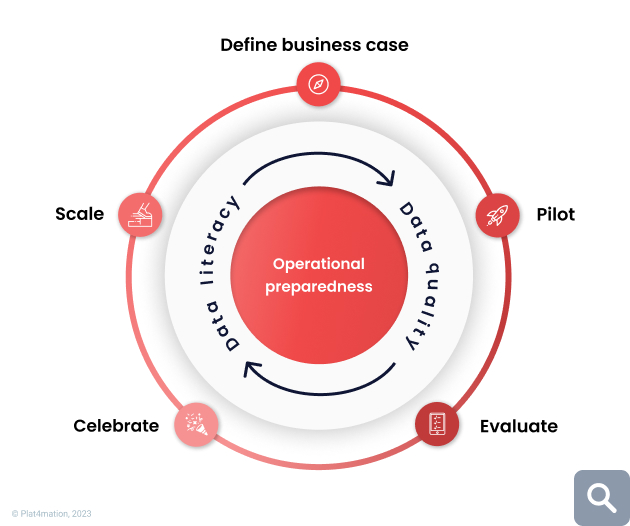Contact person
Maud Stigter
AI Capability Expert
+31 30 760 26 70

By integrating Artificial Intelligence (AI), ServiceNow is rapidly transforming the enterprise software landscape and enhancing their platform’s capabilities.
To ensure effective change, we need an in-depth understanding of ServiceNow AI. A solid understanding of different AI capabilities and types within ServiceNow helps organizations unlock the full potential of their digital transformation initiatives.
ServiceNow uses the power of various LLMs to augment its functionalities, particularly through the Now LLM and Azure OpenAI integrations within the Now Assist feature. Users can activate plugins for summarization, code generation, and note generation. This significantly expands the platform’s capabilities.
The Now LLM, built on the GPT-43b architecture with an encoder-decoder mechanism, is tailored with domain-specific data to meet unique enterprise needs. Moreover, Azure OpenAI’s customizations for ServiceNow further enriches these capabilities.
For more info on the Generative AI Controller, check out Exploring Generative AI Controller: https://docs.servicenow.com/bundle/vancouver-intelligent-experiences/page/administer/generative-ai-controller/concept/exploring-generative-ai-controller.html
For more information on which LLMs ‘Now Assist’ uses, check out Reference for Now Assist: https://docs.servicenow.com/csh?topicname=now-llm-model-updates.html&version=latest
Most people mix up Gen AI and AI, but they aren’t the same. AI is broad and includes different technologies that help machines perform tasks requiring advanced reasoning capabilities. ServiceNow uses AI capabilities such as predictive intelligence, document intelligence, and task intelligence.
Gen AI, on the other hand, is a type of AI that creates original content from training or existing data. It is used in the Generative AI Controller and Now Assist.
On a high level there are two main options when it comes to Gen AI with ServiceNow; Now Assist and Generative AI Controller.
Now Assist is a set of capabilities provided by ServiceNow, while the Generative AI Controller lets you build your own capabilities by integrating with a third-party AI.
ServiceNow’s Now Assist uses the Now LLM and Azure Open AI’s LLM to offer Assistive capabilities like chat summarization, case summarization, notes generation, text to code, and search improvements.
This makes it easier to find the right information while interacting with the Now Platform. As of now, this functionality isn’t customizable, but it’s in the process of expanding. Planned enhancements include knowledge article generation, text to flow, and text to process.
ServiceNow’s Generative AI Controller helps seamless integration with leading AI models, including OpenAI, Azure Open AI, and Google Gemini.
By leveraging ServiceNow’s spokes, users can integrate functionalities such as summarization, code generation, and sentiment analysis, and build their own custom capabilities based on these AI models.
This integration requires proper licensing and configuration with the chosen third-party AI provider, allowing customization and enhancement of ServiceNow’s capabilities.
At the core of ServiceNow’s AI lies the distinction between AI, Generative AI, and Machine Learning.
Large language models and the Now Assist Gen AI Controller fall within deep learning which is a subset of machine learning.
ServiceNow not only incorporates deep learning but also offers machine learning capabilities such as regression, classification, and clustering within its Predictive Intelligence suite.
The broader AI domain includes both machine learning and deep learning, facilitating a range of AI-driven features on the ServiceNow platform. These range from AI Search to Natural Language Query and Process Mining.
ServiceNow has many AI features designed to streamline operations and enhance user experience. Key capabilities include:
These capabilities allow organizations to leverage AI without needing an in-depth knowledge of specific models or integrations.
By configuring and enabling various plugins, ServiceNow users can readily tap into the power of AI, enhancing operational efficiency and decision-making.
What sets ServiceNow Gen AI apart from other Gen AI solutions is that it uses the Now LLM, which is a specific Large Language Model trained on domain-specific data. This makes it more context-accurate and cost-effective than generic LLMs. For successful and responsible ServiceNow Gen AI navigation, a strategic approach is important. You must understand the nuances of AI and the differences between the various AI capabilities already present in ServiceNow.
Here are some tips from our ServiceNow Gen AI experts:

ServiceNow emphasizes responsible AI usage by prioritizing data privacy, marking AI-generated responses, as “AI generated”, and ensuring traceability to sources.
There is a growing need to address increasing regulatory requirements and security risks.
ServiceNow, with its Now LLM, has built-in features that keep both existing and upcoming regulations concerning GenAI in mind.
For example, any GenAI generated response is clearly indicated by the star symbol. The platform offers robust data governance tools that help manage user permissions, data encryption, and audit trails. This ensures that sensitive information is handled according to legal standards, reducing the risk of non-compliance.
Furthermore, GenAI can be customized either by using your own LLM and security/governance setup, or by customizing the prompts used with the Skill builder.
No, GenAI is not available for on-premise use right now.
If you’re using an on-premise setup, you’ll need to build your own solution because features like ServiceNow’s “Now Assist” aren’t yet compatible with on-prem environments.
ServiceNow is the ideal platform for collaborating with developers. It offers delegated development within secure scopes that prevent impact on other areas of the platform. Its identity and access management tools provide secure access for external developers.
Additionally, we can assist with governance, team structures and maximize efficiency when developing GenAI applications.
No, you can use both separately. However, based on our experience we learned that using both strengthens each other.
Need help figuring out which one is better for your task? Reach out to our experts and we will help you determine whether your use case requires smart workflows, smart automation, traditional AI, analytics AI, or GenAI.
ServiceNow offers AI functionalities like ticket routing through predictive intelligence, which is powered by machine learning, not GenAI. On top of this, GenAI features, such as summarization, can simplify tasks for agents.
From the Washington and Xanadu releases onward, ServiceNow has enhanced predictive intelligence models. Users no longer need to create or train word clouds, as ServiceNow enhances their predictive intelligence models.
ServiceNow GenAI can automatically create Knowledge Base (KB) articles by extracting information from support tickets, documentation, and user manuals. This helps keep the Knowledge Base current and comprehensive, making it easier for users to find solutions to their problems without needing to contact support.
Currently, the NowAssist feature allows KB article generation based on incidents or cases. To use other sources like existing documentation or user manuals, you can customize this by using the Skill Kit or Skill Builder tools.
Having a high-quality Knowledge Base is essential because the better the quality of the information, the more accurate the answers you’ll get when using GenAI.
Additionally, using traditional AI tools like predictive intelligence can help find similar incidents and articles, identify knowledge gaps, and prepare your Knowledge Base to get ready for GenAI.
GenAI improves how we find knowledge by using AI search that understands queries in natural language. It helps users find the right articles and provides summaries of those articles.
The main goal of a high-quality knowledge base is to reduce the number of L2 and L3 support tickets and make it easier for users to find answers on their own.
By shifting tasks from expensive support levels (L3, L2, L1) to the end user, we focus on the user experience. GenAI helps because users don’t want to read long, detailed articles; they just want quick answers.
AI search locates the specific article they need, and NowAssist provides a summary for the user. This “shift left” strategy improves efficiency without compromising the user experience.
You have a few options for using performance analytics, and now you can interact with it using natural language.
These are the three main features of performance analytics, combined with the power of GenAI.
Currently, NowAssist only supports the English language. You can use Dynamic Translations to translate input from other languages, but this only works for translating the questions. For example, you can ask a question in Dutch, get the response in English, and then use Dynamic Translations to translate the answer back to Dutch.
However, ServiceNow is working on adding support for more languages in the future
Predictive intelligence helps group similar incidents together. This means that agents only need to focus on one incident, and they can automatically update and resolve other similar incidents. It also provides suggested solutions based on previous incidents, which is all part of predictive intelligence and analytical AI.
With GenAI, when you work on an incident, it generates helpful content related to that incident. After resolving the incident, it can create a resolution note and knowledge articles, which helps you solve future incidents more efficiently and quickly.
As more incidents come in, the “shift left” approach will allow employees and end users to resolve their issues on their own. This means that the remaining incidents can be addressed more effectively.
In the future, Gen AI will continue to shape ServiceNow’s landscape. Upcoming resources like AI capability maps and informative content will help users navigate the evolving AI ecosystem. Embracing existing AI capabilities while exploring Gen AI’s potential will empower organizations to optimize workflows and unlock new efficiencies.
ServiceNow Gen AI presents an exciting chapter in the platform’s evolution. It’s a testament to continuous innovation and empowering users with intelligent solutions. With a strategic approach and a clear understanding of AI capabilities, ServiceNow users can harness Gen AI’s potential to transform their business operations and make work flow.
![]()


Sign up to our monthly Flow@Work Exclusive newsletter to get free access to our expertise and lots of tips and tricks to make work flow on the Now® Platform.